
Realising a Cohesive and Responsive ASEAN
Latest
| TIN LIÊN QUAN | |
| Viet Nam fulfills role as AIPA Chair: Top legislator | |
| Seminar looks back on Viet Nam’s role as ASEAN 2020 Chair | |
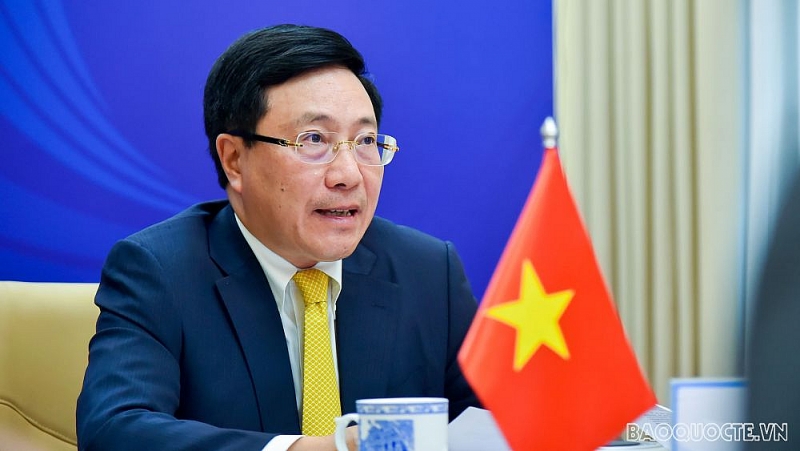 |
| H.E. Pham Binh Minh, Deputy Prime Minister and Minister of Foreign Affairs of Viet Nam. (Photo: Tuan Anh) |
What are the biggest challenges confronting Viet Nam as the ASEAN Chair this year?
2020 was indeed an extraordinary year for the whole world and Viet Nam. We assumed the ASEAN Chairmanship amid a multitude of profound challenges around the globe, the most acute of which was the COVID-19 pandemic and its extensive repercussions. Besides, major power rivalry was escalating, multilateralism was in distress, and international law was not observed in parts of the world.
Southeast Asia was among the first regions hit by the COVID-19 outbreak. It also underwent significant pressure from major power rivalry and other geo-strategic challenges. Against this backdrop, it was imperative to bolster cooperation within ASEAN, and between ASEAN and its partners. Viet Nam, as the ASEAN Chair, was charged with consolidating the Community’s unity and centrality to effectively address the challenges, particularly the pandemic’s negative impacts.
Despite the disruptions of COVID-19, what are the key deliverables that ASEAN has managed to achieve this year?
Guided by the spirit of a “Cohesive and Responsive” Community, ASEAN member states have risen to the challenges by concerted efforts, and together achieved significant results. ASEAN has managed to strengthen its unity, enhance its role and status, and push forward its priorities for regional cooperation with the following key deliverables:
- ASEAN has sustained the community-building momentum by fully realising most of its targets and plans for 2020. These include completing the mid-term reviews of the three ASEAN Community Blueprints in the Political-Security, Economic and Socio-Cultural pillars, providing guidance on the development of a Post-2025 Vision for ASEAN, scoping the review of the ASEAN Charter, and aligning sub-regional development and narrowing of the development gap with the overall development programs of ASEAN.
- ASEAN has fostered close regional coordination in COVID-19 response and economic recovery, through the operationalisation of the COVID-19 ASEAN Response Fund, launching of the ASEAN Regional Reserve of Medical Supplies for Public Health Emergencies, completion of the ASEAN Comprehensive Recovery Framework and its Implementation Plan, and establishment of the ASEAN Centre for Public Health Emergencies and Emerging Diseases.
- ASEAN centrality continued to be enhanced as the Community has played an increasingly active role in promoting peace and preserving stability in the region. ASEAN has consistently persevered with its common position on issues related to regional peace, stability and security, and played an active role in addressing regional and international hot spots such as the South China Sea, the Rakhine State of Myanmar, the Korean Peninsula, and the Middle East peace process. ASEAN-led mechanisms, including the ASEAN Plus One, ASEAN Plus Three, East Asia Summit (EAS), ASEAN Regional Forum (ARF) and ASEAN Defence Ministers Meeting-Plus (ADMM-Plus), have grown in importance and substance.
- ASEAN’s external relations have deepened and expanded. In 2020, Cuba, South Africa and Columbia were admitted to the Treaty of Amity and Cooperation in Southeast Asia (TAC) as High Contracting Parties. ASEAN also conferred the Development Partner status on France and Italy, and upgraded the ASEAN-EU Dialogue Relations to Strategic Partnership.
- ASEAN has contributed to the regional economic integration and multilateral trade liberalisation with the signing of the Regional Comprehensive Economic Partnership (RCEP) Agreement on the sidelines of the 37th ASEAN Summit after eight years of tough negotiations. The RCEP conclusion was a testament to ASEAN’s strong commitment to an open, transparent and fair multilateral trading system.
Are there any targeted deliverables for 2020 that have been deferred due to COVID-19?
Just like other regional organisations, the ASEAN cooperation agenda in 2020 has been affected by the COVID-19 pandemic. A number of meetings had to be cancelled or postponed whereas some negotiations, including on a Code of Conduct in the South China Sea (COC), have not progressed as expected. In the defence sector, several high-profile events such as the Viet Nam International Defence Expo 2020 and the International Fleet Review 2020 could not proceed as planned. However, in general, ASEAN has managed to achieve all the key targets set out for 2020.
Almost all ASEAN meetings have gone virtual in 2020. What are the difficulties that the Chair has had to overcome to enable productive online meetings?
Most preparations for ASEAN meetings this year, in terms of agenda, programme, logistical-technical arrangements and media coverage, have been adjusted to the virtual format. Several conditions had to be met to enable productive online meetings, i.e. (i) adequate ICT infrastructure with high-speed and stable Internet connections; (ii) cyber-security and confidentiality; (iii) suitable timing and agenda to accommodate the different time zones. With strong determination and thanks to the effective support and collaboration of fellow member states and external partners, Viet Nam has managed to overcome all these technical and technological constraints, and successfully convened all ASEAN high-level meetings through videoconferencing while ensuring proper protocol, substantive agenda and cyber-security.
Going forward, do you think “going online” would be the future format of most ASEAN meetings?
Direct and virtual meetings have their own pros and cons. They are not mutually exclusive but rather mutually reinforcing. Whether a meeting should be conducted indirect, virtual, or hybrid format depends on various factors such as the urgency of the situation at hand, the importance of the subject matter, and technical and technological availability. Due to COVID-19, most of the ASEAN meetings this year were held online. Thanks to the support and collaboration from fellow ASEAN member states and partners, those meetings were successful, which provided us with many useful lessons to further improve ASEAN’s modus operandi going forward. At the same time, we will continue to leverage direct meetings, including interactions between and among the leaders, to maximise the cooperation within ASEAN as well as between ASEAN and its external partners.
Viet Nam’s success in containing the COVID-19 outbreak is a rare bright spot in the region. Are there any good practices and lessons learned that Viet Nam would like to share on the ASEAN health cooperation agenda?
Viet Nam’s success in bringing the COVID-19 under control has been recognised by the international community. The achievement is attributed to the following important factors: (i) The holistic whole-of-society approach that focuses on “proactive prevention, early detection, timely quarantine, rapid isolation, resolute containment, and effective treatment”; (ii) The Vietnamese government’s rapid and thorough guidance with the strong support of our people; (iii) Timely and transparent communication of the pandemic-related information and the government’s pandemic response strategy through many channels; and (iv) Pandemic response in parallel with sustaining business and production activities, social welfare protection, and community mutual support so that no one is sidelined and left behind. Viet Nam has also proactively participated in regional and international efforts in pandemic response and rendered support and assistance to other countries within its capacity. I would like to take this opportunity to express sincere gratitude to fellow ASEAN member states and the international community for their meaningful assistance to Viet Nam in handling the pandemic.
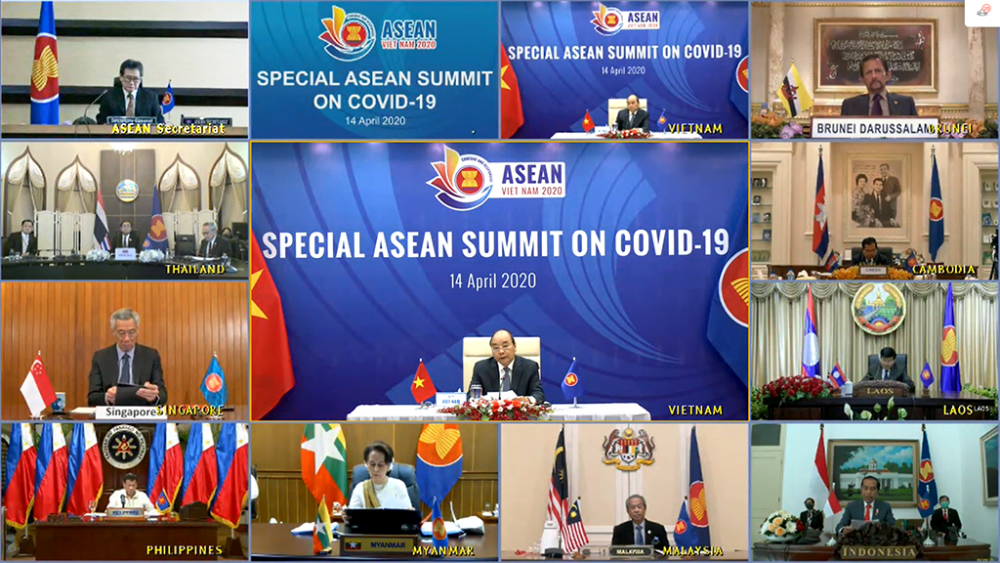 |
| Special ASEAN summit on COVID-19. (Photo: asean.org) |
The theme “A Cohesive and Responsive ASEAN” for Viet Nam’s Chairmanship is so pertinent given the challenges faced. How has this theme been translated into action this year?
ASEAN has fully lived up to the “Cohesive and Responsive” spirit in 2020, which has manifested the strength of its unity, resilience, courage and adaptability to cope with unprecedented adversities.
ASEAN’s cohesiveness has shone through the solidarity and close cooperation among the member states in the development and implementation of various practical initiatives, programmes and plans of action to build a strong and prosperous ASEAN Community, and especially to contain COVID-19 and enable post-pandemic recovery.
All the deliverables adopted at the ASEAN Summits and sectoral ministerial meetings this year are imbued with the “Cohesive and Responsive” spirit. The ASEAN Foreign Ministers’ Joint Statement on the Importance of Maintaining Peace and Stability in Southeast Asia, which was issued on the 53rd anniversary of ASEAN, reiterates ASEAN’s common position in preserving independence and neutrality amid complicated developments in the regional and global landscape.
Viet Nam has led the charge in building a principled ASEAN position on the South China Sea anchored in international law, especially the 1982 UNCLOS. How can ASEAN sustain the momentum that it has achieved this year?
Maintaining the regional peace, security and stability, including in the South China Sea, is the common aspiration and shared interest of the regional and international community, particularly of ASEAN. ASEAN and its member states, including Viet Nam, have therefore exerted tremendous efforts in this regard, from promoting dialogue and cooperation to developing mechanisms and norms of conduct in the South China Sea.
In 2020, ASEAN reaffirmed the importance of observing international law in resolving the disputes in the South China Sea, and of upholding the 1982 United Nations Convention on the Law of the Sea (UNCLOS) as the overarching legal framework governing all activities at sea. Countries also expressed expectations that an effective and substantive COC in line with international law, including UNCLOS, would soon be concluded.
In that spirit, going forward, ASEAN needs to maintain its principled position on the South China Sea. The South China Sea issue should remain a key agenda item of ASEAN in pursuit of the shared goals of peace, stability and cooperation in the region and the world at large.
Do you think that ASEAN centrality is under duress due to the unfolding major power dynamics, especially the US-China strategic rivalry? What can ASEAN do about it?
ASEAN centrality has been a product of ASEAN’s evolution. The role of ASEAN has been recognised by its partners, including the major powers, for its significant contributions to the regional peace, development and cooperation. ASEAN has initiated and played a leading role in the ARF, EAS, ADMM and ADMM-Plus. The Association also actively took part in addressing regional affairs.
The ongoing dynamics in the global landscape, including major power rivalry, have exerted multifold impacts on ASEAN, presenting both opportunities and challenges. Whether ASEAN centrality can be maintained and enhanced largely depends on ASEAN itself. A united, cohesive and prosperous ASEAN would be able to overcome all challenges and prove its relevance.
It is encouraging that all major powers continue to attach importance to ASEAN and the ASEAN-led mechanisms, seeing them as useful platforms to discuss regional affairs. Going forward, ASEAN needs to further consolidate its cohesiveness and responsiveness by putting forward more initiatives relevant to the regional and global interests, thereby sustaining and promoting ASEAN centrality in the evolving regional architecture.
Viet Nam also commemorates the 25th anniversary of its admission into ASEAN this year, which was hailed as a historic milestone in Viet Nam’s contemporary international relations. Why is that so?
Joining ASEAN in 1995 was the first critical step in Viet Nam’s regional integration. ASEAN was also the first “playing field” for Viet Nam to gradually expand and deepen its international integration. The accomplishments in the socio-economic development of Viet Nam over the past three decades and the fruits from its ASEAN membership have proven that it was the right decision.
ASEAN membership has provided a peaceful regional environment conducive to Viet Nam’s economic development. ASEAN also offers a conduit for the country to strengthen relations with the major powers and its key partners and enhance its international standing. To date, Viet Nam has established strategic and/or comprehensive partnerships with 30 countries, including the five permanent members of the United Nations Security Council and all fellow ASEAN member states.
The admission of Viet Nam into ASEAN 25 years ago also opened a new and brighter chapter in the Association’s evolution. Mutual distrust gradually gave way to collective efforts among the regional countries to respond effectively and in a timely manner to all dynamics in the region. It also heralded the beginning of an ASEAN-10 with all ten Southeast Asian states determined to contribute responsibly and actively to peace, stability and prosperity in the region and the world.
ASEAN has always been a priority of Viet Nam’s foreign policy throughout the past 25 years. Going forward, ASEAN will remain a top priority in Viet Nam’s foreign policy in pursuit of independence, self-reliance, diversification and multilateralisation. As an active member of ASEAN, Viet Nam will do its utmost, together with fellow member states, to build a stronger and more prosperous ASEAN Community that earns a higher standing in the international arena.
| Deputy Prime Minister, Minister of Foreign Affairs Phạm Bình Minh, member of the Politburo of the 12th Central Committee of the Communist Party of Viet Nam, has been working in the Foreign Service for nearly 40 years. He has held various important positions in his career and built up a wide range of experience and in-depth expertise in both bilateral and multilateral diplomacy. |
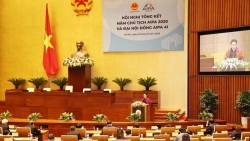
| Viet Nam fulfills role as AIPA Chair: Top legislator Viet Nam has well fulfilled its role as Chair of the ASEAN Inter-Parliamentary Assembly (AIPA) in 2020 despite serious impacts of the COVID-19 pandemic and ... |
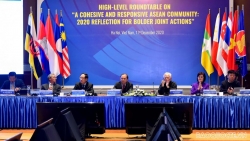
| Seminar looks back on Viet Nam’s role as ASEAN 2020 Chair The Ministry of Foreign Affairs on December 17 hosted an international seminar to look back on the ASEAN Chairmanship 2020 of Viet Nam under the ... |
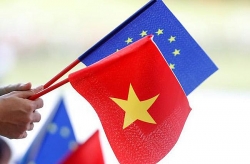
| EU leaders wish to strengthen cooperation with Viet Nam President of the European Council Charles Michel and President of the European Commission Ursula von der Leyen have sent congratulations to President Nguyen Phu Trong ... |












